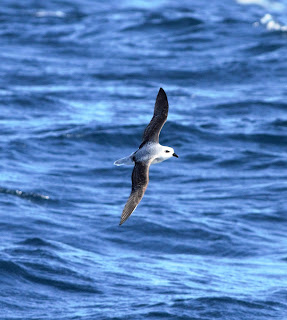
Sunshine Coast Birds
Birding and other wildlife experiences from the Sunshine Coast and elsewhere in Australia - and from overseas - with scribblings about travel, environmental issues, kayaking, hiking and camping.
Tuesday, 4 May 2021
Eaglehawk Neck double header pelagics May 1-2, 2021
We headed off about 7am on both Saturday May 1 and Sunday May 2 for pelagic trips off Eaglehawk Neck in conditions that were similar on both days: starting off with a gentle 5-10knot NW breeze and little swell, with the wind picking up to 10-15 knots and moving to N as the day progressed and a 1.5-2m swell. Fine, relatively warm (water temperature 16) and sunny, with light cloud sometimes on Sunday. On both occasions we checked out Chevron Rock and the Hippolyte on the way out where the usual good numbers of Australian Fur-Seal, Black-faced Cormorant, Kelp Gull and other inshore birds were present.

Short-tailed Shearwaters were common inshore with smaller numbers out wide, while Sooty Shearwater was widely dispersed but small in number.
On Saturday we laid berley trails at 310, 260 and 470 fathoms. On Sunday the trails were at 235, 540 and 95 fathoms. Great-winged Petrels (below) began appearing well before the shelf but were more frequent out wide, appearing in reasonable numbers on both days.
Grey-faced Petrel was in much smaller numbers.
White-chinned Petrel was common on both days, as to be expected.
White-headed Petrel (first image and below) was spotted regularly at the shelf, with a couple of birds closer inshore on Sunday; it was a reasonably common species for the day. Providence Petrel was about in small numbers.
A single Cape Petrel (race capense) was about most of the day offshore on Saturday.
Small numbers of Fairy Prions were about off the shelf and closer in.
A single White-fronted Tern appeared over the shelf on Saturday.
Grey-backed Storm-Petrel showed well off the shelf with three birds seen on Saturday.
White-faced Storm-Petrel performed nicely on both days.
Surprisingly just a single Wilson’s Storm-Petrel appeared.
Single Yellow-nosed Albatross were seen inshore briefly on both days, not offering much of a photo opportunity.
Buller’s Albatross was in good numbers, especially on Sunday when several birds were present inshore.
A single Salvin’s Albatross on Saturday was a sight for sore eyes.
Shy Albatross was as usual the most plentiful albatross.
Black-browed Albatross was surprisingly absent on Saturday but adults and immatures were about on Sunday.
Just a single Campbell Albatross was seen over the weekend.
A single Wandering Albatross was recorded, soon after we arrived on the shelf on Saturday.
Two Antipodean Albatross were seen on Saturday and two again on Sunday, all of race gibsoni.
A single Northern Royal Albatross was spotted distantly when we arrived at the shelf on Sunday. The image below is from John Baas.
Two Southern Royal Albatross were also seen at the shelf on Sunday.
Single Brown Skuas were seen out wide on both days and a flock of three inshore on Saturday was unexpected. A couple of people saw a few Common Diving-Petrels inshore on Sunday.
Seabirds aside, the big surprise of the weekend was a Spangled Drongo – a very rare vagrant in Tasmania - appearing off the shelf on Saturday. Also on Saturday, a Blue Shark hung around the boat for quite awhile while we were on the shelf.
The troops: Peter and Margie Appleton, Scott Baker, John Baas, Janet Carew, Michael Kearns, Chris Murray, Cheryl Ponter, Greg Roberts, Nick Thompson, Jayden Walsh, Peter Vaughan, Els Wakefield. Special thanks to Karen Dick for helping me out with the organisation, to Scott Baker for scrutinising the great albatross and to Peter Vaughan for his expert local knowledge and writing up the Saturday elist; I’ve submitted the Sunday elist. All up a good variety of birds with 32 species recorded, including 10 albatross species. Below is an image of some of the Australian Fur Seals, followed by a full species list for the weekend with the total number seen for Saturday first and Sunday second.
Australasian Gannet: 16 and 7,
White-headed Petrel: 4 and 14,
Providence Petrel: 1 and 5,
Grey-faced Petrel: 1 and 3,
Great-winged Petrel: 12 and 15,
White-chinned Petrel: 8 and 10,
Fairy Prion: 5 and 5,
Short-tailed Shearwater: 65 and 150,
Sooty Shearwater: 4 and 4,
Common Diving-Petrel: 0 and 3,
Wilson’s Storm-Petrel: 0 and 1,
Grey-backed Storm-Petrel: 3 and 0,
White-faced Storm-Petrel: 5 and 2,
Yellow-nosed Albatross: 1 and 1,
Buller’s Albatross: 9 and 17,
Shy Albatross: 32 and 30,
Salvin’s Albatross: 0 and 1,
Black-browed Albatross: 0 and 5,
Campbell Albatross: 0 and 1,
Wandering Albatross: 1 and 0,
Antipodean Albatross: 2 and 2,
Northern Royal Albatross: 0 and 1,
Southern Royal Albatross: 0 and 2,
Crested Tern: 270 and 140,
White-fronted Tern: 1 and 0,
Silver Gull: 160 and 130,
Kelp Gull: 60 and 45,
Pacific Gull: 1 and 0,
Brown Skua: 4 and 2,
Black-faced Cormorant: 270 and 160,
White-bellied Sea-Eagle 2 and 2

Subscribe to:
Post Comments (Atom)







































No comments:
Post a Comment